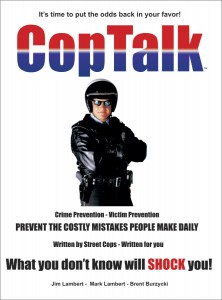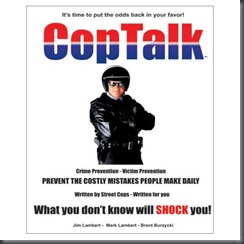Podcast: Play in new window | Download
Subscribe: RSS
-
- In the News
- Cameras and the Police – More coming in the next show….
- NY Protests
In The News:
http://www.azcentral.com/video/1150177012001
Phoenix Az brothel poses as churchhttp://www.contracostatimes.com/weird-news/ci_18884594
Courts–Man sues white castle over booth sizehttp://www.contracostatimes.com/weird-news/ci_18883879
burglar tries to claim reward moneyhttp://policelink.monster.com/news/articles/155535-off-duty-cop-dressed-as-clown-kills-teen-robber
http://www.ohio.com/news/break-news/jail-inmate-lack-of-porn-violates-u-s-constitution-1.223893
http://www.huffingtonpost.com/2011/09/15/gumby-theif-boss-joe-clokey-robbery-video_n_963507.html
Gumby RobberyNJ police chief: Double-parking wife not above law
The Associated Press
Posted: 09/29/2011 10:14:13 AM PDTLODI, N.J.—A New Jersey police chief says no one is above the law—not even his wife.
Lodi (LOH’-deye) Police Chief Vincent Caruso ordered an officer to ticket his wife after she double parked while dropping off their 5-year-old son at school.Caruso told The Record newspaper ( http://bit.ly/pksv9y) he didn’t want her to get any special treatment because of who she is. The chief paid the $54 ticket. It’s not the first time for Paula Caruso. The chief ordered another officer to ticket her two years ago after she forgot to move their vehicle for street cleaning. The chief told the newspaper he loves his wife and she’s very busy driving their four sons around. His wife couldn’t be reached for comment Thursday. The Carusos’ phone number is unlisted.
Associated Press Posted: 10/03/2011 08:27:37 AM PDT Updated: 10/03/2011 08:29:33 AM PDT
OAKLAND, Calif. (AP) — An Oakland officer’s city-issued video camera shows the shooting death of an armed suspect during a struggle with police. The Police Department won’t release details on what is depicted in the video of the Sept. 25 incident. The San Francisco Chronicle says the city of Oakland paid $540,000 for 350 wearable cameras last year from Vievu of Seattle. The cameras are worn on the chest of officers. Investigators say two officers pulled over a car and the passenger, who had a gun and drugs, fled on foot. One of the officers caught the suspect and shot him during a struggle. The name of the suspect and the officers has been withheld.
A pair of Alabama conservation enforcement officers think they’ve come up with the perfect way for avid hunters to honor their loved ones for eternity. Officers Thad Holmes and Clem Parnell have launched Holy Smoke LLC, a company that will, for a price, load cremated human ash into shotgun shells, and rifle and pistol cartridges.
It’s the perfect life celebration for someone who loves the outdoors or shooting sports, Parnell says.
“This isn’t a joke. It’s a job that we take very seriously,” he said. “This is a reverent business. We take the utmost care in what we do and show the greatest respect for the remains.”The company, launched in July, shipped out its first two orders on Sept. 16 – one from Florida and one from Kentucky – Holmes says. It has established www.myholysmoke.com to promote the service and traffic on it has been growing , Holmes says.
For $850, one pound of ash will be loaded into 250 shotgun shells. The ash is mixed in the cups that hold the shot, not the powder. The same amount of ash will fill the bullets of 100 standard caliber center-fire rifle rounds or 250 pistol rounds. For the rifle and pistol ammunition, the ash is put into the tips of hollow-point bullets with the cavity sealed with wax. Any remaining ash is shipped back to the customer, along with the loaded ammunition.
“Some people have been concerned that a small amount of ash will remain in the animal that is shot with the ammunition, Holmes said. “But it’s just carbon, and a small amount at that. You don’t have anything to worry about.” The process takes about 48 hours from the time the ashes are received, Holmes said. “The people we use are all experienced reloaders and know exactly what we want them to do, he said. “Only one bag of ash will be opened at a time, and the equipment will be thoroughly cleaned before the next set of remains is loaded.Tim Godwin, a Montgomery landscaping company owner and avid hunter, says he sees no problem with the practice.
“People have had their ashes sprinkled in rivers and the ocean, there have been ashes spread out of airplanes,” he said. “If you love hunting or the outdoors, this really isn’t much different.”
People should take care in with how the meat that is shot with this ammunition is handled, cautions Robert Chapin, a toxicologist who worked for 18 years at the National Institute of Environmental Health Sciences.
The animal should be killed quickly by the shot, to prevent any possibility of spreading the ashes in the animal’s blood, he says. The area around where the animal was struck should not be consumed.“I would expect that the ashes would pose less of a problem than any lead pellets historically used,” Chapin says.
————————————————————————————————————————————————————
Serious crimes to warn people about http://www.contracostatimes.com/crime-courts/ci_18884334
SJSU sexual assault  (Don’t walk alone, don’t take risk)———————————————————————————————————————————————————–
And a recent local robbery where 2 suspects used a ruse to get an elderly couple in their 70’s to open their door at 0130 hrs, tied up the woman and beat the man until he opened a safe.
————————————————————————————————————————————————————
Subject: New California law bans warrantless cell phone searches
http://edition.cnn.com/2011/09/20/tech/mobile/california-phone-search-law/
New law bans warrantless cell phone searches
Editor’s note: Amy Gahran writes about mobile tech for CNN.com. She is a San Francisco Bay Area writer and media consultant whose blog, Contentious.com, explores how people communicate in the online age.
(CNN) — If you get arrested in California for any reason, the photos, e-mails and other personal data on your cell phone are now a bit safer from prying police eyes. A new law now requires law-enforcement officers in that state to obtain a warrant before searching the cell phone of a person placed under arrest.
This law overrides a January ruling by the California Supreme Court. According to California Sen. Mark Leno, who sponsored the legislation, this ruling had “legalized the warrantless search of cell phones during an arrest, regardless of whether the information on the phone is relevant to the arrest or if criminal charges are ever filed.”
The new California law unanimously passed in the state Assembly. Today the office of Gov. Jerry Brown confirmed that since the governor did not make a specific decision on this legislation, it became automatically enrolled as a law this week.
Under this legislation, California law enforcement officers must first obtain a search warrant when there is probable cause to believe a suspect’s portable electronic device contains evidence of a crime.
The Peace Officers Research Association of California, which opposed the law, argued: “Restricting the authority of a peace officer to search an arrestee unduly restricts their ability to apply the law, fight crime, discover evidence valuable to an investigation and protect the citizens of California.”
The California legislature disagreed, finding that “once in the exclusive control of the police, cellular telephones do not ordinarily pose a threat to officer safety.” Furthermore, lawmakers found that existing practices — including confiscating the phone (without searching it) or promptly applying to a judge for a search warrant — alleviate concerns about destruction of evidence.
This isn’t just about cell phones. The wording of this law specifically refers to “portable electronic devices,” defined as: “any portable device that is capable of creating, receiving, accessing, or storing electronic data or communications.”
So in addition to cell phones this might conceivably cover tablet computers, laptops, netbooks, e-readers, media players, gaming devices, digital cameras, audio recorders, external hard drives, flash drives and other devices available now or in the future.
The new law can strengthen the rights to freedom of speech and assembly in California. The prior court ruling — though aimed mainly at gathering evidence about criminal activity such as drug deals or prostitution — also could be used by police to gain intelligence about the identities or activities of people at protests or other public or private gatherings.
Hanni Fakhoury, staff attorney for the Electronic Frontier Foundation, explained why law-abiding citizens should worry about warrantless cell phone searches. “It’s really easy to pick on people who have been arrested and charged with crimes. But that subset could get expanded to cover everyone. Also, an arrest is not the same as a conviction.”
The new law also strengthens California’s protections for journalists and their sources, according to the California Newspaper Publishers Association. The state’s “shield law,” which prohibits the state or other litigants from subpoenaing reporters’ unpublished notes or other sensitive information related to their work.
Many reporters keep such information on their cell phones and other devices, and it’s not unheard of for journalists to get arrested in California.
Fakhoury noted that once police do obtain a warrant to search an arrestee’s phone or other portable electronic device, it’s possible that everything on that device might become fair game for law enforcement or prosecution.
“If they have a search warrant, depending on its scope, it might be tough to restrict what information on phones they get and how they use it,” he said. “Courts are divided on this. They recognize that there must be limits to searches — but they also know that incriminating evidence can be anywhere, and it’s likely to be hidden.”
In recent months the issue of warrantless cell phone searches has arisen in several states with varying results. For instance, the Ohio Supreme Court barred warrantless cell phone searches, but lower courts in Georgia and Florida have upheld such searches.
And in May the Oregon Supreme Court declined to hear, which could have disallowed warrantless cell phone searches in that state.
Fakhoury of EFF believes that California’s new law sends a strong message to other courts and legislatures around the U.S. — including the U.S. Supreme Court.
“I certainly see this issue ending up in the U.S. Supreme Court at some point,” said Fakhoury. “None of the cases involved relied solely on state law. They all raised constitutional issues. There would be no reason for the Supreme Court not to get involved.”
The opinions expressed in this post are solely those of Amy Gahran.
————————————————————————————————————————————————————
Making a Point about Lasers
Illegal Use of Devices a Serious Crime09/26/11
Justin Stouder was aiming a laser pointer at a distant tower from his suburban St. Louis yard one April evening in 2010 when a police helicopter appeared in his line of sight more than a mile away.
At the time, the 24-year-old had no idea that his decision to point the laser at the helicopter was a federal felony—or that the beam of light might have serious consequences for the pilot and his crew.
“It’s equivalent to a flash of a camera if you were in a pitch black car at night,†said St. Louis Metropolitan Police Officer Doug Reinholz, the pilot on patrol that night when Stouder’s green hand-held laser “painted†his cockpit. “It’s a temporary blinding to the pilot,†he said during a recent news conference highlighting the danger of lasers directed at airplanes and helicopters.
Interfering with the operation of an aircraft is a crime punishable by a maximum of 20 years in prison and a $250,000 fine, and laser incidents are on the rise. Since the FBI and Federal Aviation Administration (FAA) began keeping records of laser events in 2004, “there has been an exponential increase every year,†said Tim Childs from the Federal Air Marshal Service, who serves as a liaison officer with the Bureau on laser issues.
In closing:
- Website www.coptalk.info
- Stitcher.com
- Subscribe and give us a review on itunes
- Ask a cop section? Please ask your questions…
- Email Subscription – Sign Up on the site
- Thanks for your support over the past 10 years and thanks for continuing to follow our site
STAY SAFE!
Please send in your questions: https://www.coptalk.info/ask-a-cop-ask-us-a-question/






